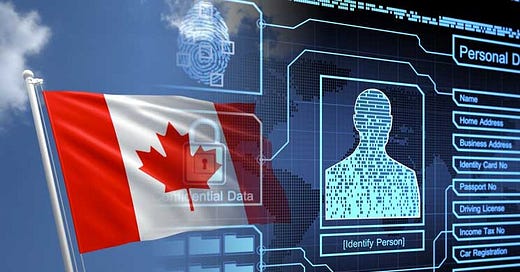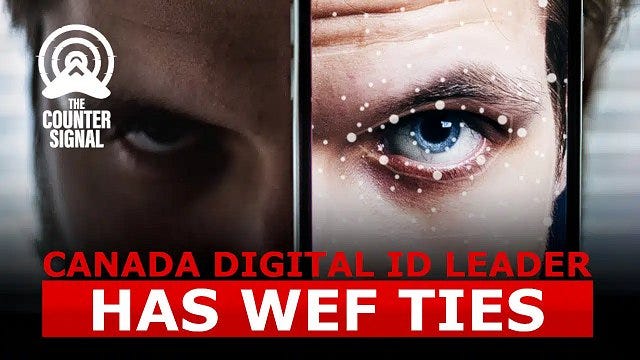What’s the latest on Canada’s Digital ID?
by Dan Fournier, published Wednesday, Dec. 21, 09:39 EST on fournier.substack.com
Introduction
Since the Covid-19 Pandemic, a lot of our activities – be it working, studying, shopping, paying bills, or playing – have increasingly migrated to online platforms. With it has come the need for increased vigilance and security, for risks such as fraud, scams, identity theft, and the like have proliferated.
As 2023 is fast approaching, many Canadians are concerned about how to securely navigate in this rapidly-evolving digital landscape.
Authentication, the process which involves properly identifying individuals, varies greatly across services such as for banking, obtaining services from government institutions, receiving customer support, and so on. Some are painless, while others can be downright annoying and frustrating.
Biometrics – which involves identifying people through their unique physical attributes such as fingerprints, facial or voice recognition – are on the rise. But many view these as intrusive and do not wish to have their personal biometric information collected, stored, or shared between various parties.
As of now, there are no clear sets of standards and features that envelop Digital IDs.
There are currently many potential ways in which a Digital ID can be developed and used in Canada by different parties to serve various purposes.
Which parties are currently involved in their development?
The first and most important player in the development of a Digital ID is the Government of Canada, for it wants to streamline the way it authenticates individuals to securely access its services.
Inevitably, many partners from the private sector are already contracted for consultation and development of a Digital ID.
It remains to be seen whether or not a, catch-all, National Digital ID will emerge, or if there will be different ones suited for different purposes.
And we must not exclude a possible linkage whereby IDs become linked to peoples’ CBDC wallets which will inevitably arrive in the next few years.
For now, there seems to be two major players involved in the conception, design, and development of a Canadian Digital ID.
The first one is the Digital Identification and Authentication Council of Canada, or DIACC, a non-profit coalition of private and public sector participants.
The second major player is a Canadian private corporation called Trulioo. This tech outfit has many key partners, including Equifax and TransUnion, two of Canada’s biggest credit-rating agencies, and provides a wide range of verification services, such as Age Verification and Know Your Customer (KYC), for government and businesses.
The help build trust, these two outfits are collaborating on the Pan-Canadian Trust Framework.
On the matter, Canada’s Privacy Commissioner Philippe Dufresne said: “The development and implementation of a digital ID ecosystem is a tremendous opportunity to demonstrate how innovation and privacy protection can coexist.”
“Government should be open and transparent enough about the defined purposes of the digital identity systems, what personal information will be used, how and by whom,” added the commissioner.
One potential roadblock to building this trust, however, stems from the fact that Trulioo is affiliated with the World Economic Forum (WEF) – who many regard with suspicion and disdain.
Concerns Canadians have with Digital IDs
Privacy, security, and choice figure among some of the top concerns Canadians have which DIACC is currently evaluating.
Not only are Canadians distrustful of many private entities, but even in government institutions. According to the Edelman 2022 Canadian Trust Barometer, only 53 per cent of Canadians trust government organizations.
Another major concern is that a national Digital ID may present a barrier to international travel.
A Known Traveller Digital Identity (KDTI) pilot program was launched in 2018 by the World Economic Forum in which the Government of Canada and Trudeau Montreal Airport figure as partners.
Some worry that their vaccination status or other personal factors may hinder their mobility rights.
On the flipside
If properly designed and implemented, a national Digital ID could bring benefits such as eliminating the need for managing multiple passwords and increased trust and confidence accessing online services.
Addendum (Dec. 28):
Thanks to the stellar work of fellow Canadian James Corbett (of The Corbett Report fame), we must also note that the push for Digital IDs is not limited to Canada, but is worldwide.
James had an entire episode titled The Global Digital ID Prison dedicated to this topic from earlier this year.
As per James’ work, here are some countries that are hard at work in the implementation of national Digital IDs (along with Mastercard):
AUSTRALIA:
- Reclaim the Net - Australia considers centralizing digital ID, October 24, 2022
https://reclaimthenet.org/australia-considers-centralizing-digital-id/
BRAZIL:
- Reclaim the Net - Brazil continues rollout of digital versions of national ID card, November 6, 2022
https://reclaimthenet.org/brazil-continues-rollout-of-digital-versions-of-national-id-card/
DENMARK:
- Reclaim the Net - Stores in Denmark call for digital ID age verification, November 28, 2022
https://reclaimthenet.org/stores-in-denmark-call-for-digital-id/
EUROPEAN UNION (EU):
- Activist Post - EU Planning Digital ID Wallet by 2024 Regardless of Challenges, NOVEMBER 16, 2022
https://www.activistpost.com/2022/11/eu-planning-digital-id-wallet-by-2024-regardless-of-challenges.html
INDIA:
- Reclaim the Net - Indian citizens that don’t link account numbers to Digital ID will soon face financial blacklisting, Forcing the uptake of digital ID. December 13, 2022
https://reclaimthenet.org/india-digital-id-account-link/
- India Today - Baal Aadhaar card biometric update mandatory: what is it, how to update, Nov. 23, 2022
https://www.indiatoday.in/technology/news/story/baal-aadhaar-card-biometric-update-mandatory-what-is-it-how-to-update-2300686-2022-11-23
note: notice the name 'Baal' from the Canaanite deity, Ba'al to which children were sacrificed.
JAPAN:
- The Asahi Shimbun - Only My Number card accepted to get smartphone vaccine passport, Oct. 20, 2021
https://www.asahi.com/ajw/articles/14464635
NEW ZEALAND:
- Reclaim the Net - New Zealand’s quarantine program utilizes digital ID wallets, November 18, 2022
https://reclaimthenet.org/new-zealands-quarantine-program-utilizes-digital-id/
SCOTLAND:
- GlobalResearch.ca - Scotland’s Government Is Rolling Out a ‘Digital ID’ Platform, to be Connected to Social Security, NHS Health Services and Experian Credit Scoring Company, 20 November 2022
https://www.globalresearch.ca/scotland-government-rolling-out-digital-id-platform-connected-social-security-nhs-health-services-experian-credit/5799810
MASTERCARD:
- Reclaim the Net - Mastercard just outlined its digital ID push
https://reclaimthenet.org/mastercard-just-outlined-its-digital-id-push/
Notes:
This article is also in The Counter Signal.
Disclaimer:
See the author’s About page for full disclaimer.







Thanks Dan.
This was good information.
My son is 19 and starting his career in Canada as an ironworker.
We have avoided the inoculations we don't agree to a digital ID or social credit score.
It's going to be hard to avoid but we are not taking a knee to any WEF swabs or any government official mandates.
I don't understand the vaccination part. It would have to be some other future "vaccine". With millions not going for the boosters, not sure how this will play out. Maybe I'm being too optimistic, but I think they may be overplaying their hand here. Digital ID will come in some form but maybe the obstacles in its way may slow down its ambitions. Plus it's the government. Many of these people running this in Canada are clowns. Literal incompetent bozos. They can't even procure proper mask deals. I don't think they're up for this. Quebec is aiming for 2025. I'm betting it gets delayed.